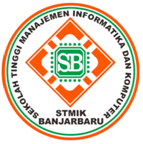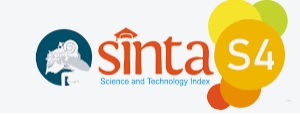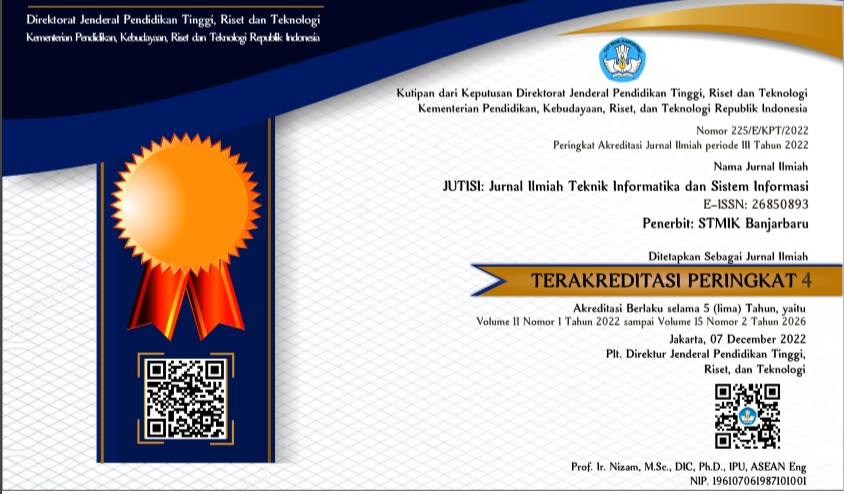Tinjauan Literatur Tentang Sistem Crowdsourcing Dalam E-Government: Aktivitas, Proses Dan Teknologi
Abstract
The application of crowdsourcing in e-government has developed into a strategy to increase public participation, transparency and service efficiency. This research aims to systematically examine activities, processes and technology in government crowdsourcing systems. Twelve selected scientific articles published in the last five years were evaluated using the literature review method. Studies show that crowdsourcing helps gather public input, solve problems, and create policies. An effective process involves discussion of different ideas and participation in the government's decision-making process. Technologies such as artificial intelligence and blockchain increase the reliability, security and transparency of systems. This study provides a concept map of the use of crowdsourcing in e-government and emphasizes how important it is to create systems that are participatory and adaptive to technological developments.
Keywords: Crowdsourcing; E-Government; Participation; Artificial Intelligence; Blockchain
Abstrak
Penerapan crowdsourcing dalam e-government telah berkembang menjadi strategi untuk meningkatkan partisipasi publik, transparansi, dan efisiensi layanan. Penelitian ini bertujuan mengkaji secara sistematis aktivitas, proses, dan teknologi dalam sistem crowdsourcing pemerintahan. Dua belas artikel ilmiah terpilih yang dipublikasikan dalam lima tahun terakhir dievaluasi dengan menggunakan metode tinjauan literatur. Kajian menunjukkan bahwa crowdsourcing membantu mengumpulkan masukan publik, memecahkan masalah, dan membuat kebijakan. Proses yang efektif melibatkan diskusi tentang ide-ide yang berbeda dan partisipasi dalam proses pengambilan keputusan pemerintah. Teknologi seperti kecerdasan buatan dan blockchain meningkatkan keandalan, keamanan, dan transparansi sistem. Studi ini memberikan peta konsep tentang penggunaan crowdsourcing dalam e-government dan menekankan betapa pentingnya membuat sistem yang partisipatif dan adaptif terhadap perkembangan teknologi.
Keywords
References
C. Aldemir, & E. Şen, "A Model Proposal for Local Governments to Increase Citizen Involvement in the Age of Information Society and E-Government: Crowdsourcing,” in Advances in Public Policy and Administration, IGI Global, 2021, pp. 172–190. doi: 10.4018/978-1-7998-4978-0.ch010.
D. N. Gultom, E. Khairina, and L. Salsabila, “Analisis Efisiensi Dan Efektivitas E-Government Dalam Administrasi Publik,” PUBLIKA J. Ilmu Adm. Publik, vol. 10, no. 1, pp. 128–136, Apr. 2024, doi: 10.25299/jiap.2024.16516.
H. E. A. El Abdallaoui, A. El Fazziki, F. Z. Ennaji, and M. Sadgal, “A Crowdsourcing Based Framework for E-Government: Suspect Identification and Investigation,” in 2017 13th International Conference on Signal-Image Technology & Internet-Based Systems (SITIS), Jaipur, India: IEEE, Dec. 2017, pp. 380–387. doi: 10.1109/sitis.2017.69.
T. B. Dewantoro, L. Edi Nugroho, and A. E. Permanasari, “Implementing Crowdsourcing in Smart Government: An IT Perspective Review,” in 2024 International Electronics Symposium (IES), Denpasar, Indonesia: IEEE, Aug. 2024, pp. 329–334. doi: 10.1109/ies63037.2024.10665848.
I. H. Noh, “Crowdsourcing platform acting as an intermediary role in Collaborative governance,” in DG.O 2022: The 23rd Annual International Conference on Digital Government Research, Virtual Event Republic of Korea: ACM, June 2022, pp. 474–476. doi: 10.1145/3543434.3543593.
O. V. Erokhina, “DIGITAL DECISION-MAKING TECHNOLOGIES: CROWDSOURCING AS A FORM OF POLITICAL PARTICIPATION,” Vestn. Univ., no. 11, pp. 189–194, Dec. 2020, doi: 10.26425/1816-4277-2020-11-189-194.
J. Guo, Y. Bai, S. Sun, F. Liu, and J. Yang, “E-government System Based on Blockchain,” in 2023 3rd International Conference on Digital Society and Intelligent Systems (DSInS), Chengdu, China: IEEE, Nov. 2023, pp. 449–452. doi: 10.1109/dsins60115.2023.10455503.
A. Kh. Ameen, D. H. Kadir, D. A. Abdullah, I. Y. Maolood, and H. A. Khidir, “Assessing E-Government Effectiveness: A Structural Equation Modeling Approach,” ARO- Sci. J. KOYA Univ., vol. 12, no. 2, pp. 52–60, Aug. 2024, doi: 10.14500/aro.11601.
A. K. Shaikh, S. Baig, N. Adhikari, and H. A. Shihi, “E-participation System: Leveraging Blockchain Technology to Enhance Democratic Engagement,” in 2023 IEEE 8th International Conference on Engineering Technologies and Applied Sciences (ICETAS), Bahrain, Bahrain: IEEE, Oct. 2023, pp. 1–5. doi: 10.1109/icetas59148.2023.10346551.
J. Iu. Lektorova, A. Iu. Prudnikov, Perm National Research Polytechnic University, A. V. Pleshkova, and Dialog Regions, “Government crowdsourcing as a technology for territorial development and an image resource of power,” Ars Adm. Искусство Управления, vol. 14, no. 4, pp. 624–645, 2022, doi: 10.17072/2218-9173-2022-4-624-645.
H. Ulbrich, M. Wedel, and H.-L. Dienel, Eds., Internal Crowdsourcing in Companies: Theoretical Foundations and Practical Applications. in Contributions to Management Science. Cham: Springer International Publishing, 2021. doi: 10.1007/978-3-030-52881-2.
J. Zahn, E. Muorão, J. Viterbo, C. Maciel, and F. Bernardini, “Crowdsourcing in Municipal Ombudsman Offices: A Systematic Literature Review,” Conf. Digit. Gov. Res., vol. 1, May 2025, doi: 10.59490/dgo.2025.959.
A. Fornaroli and D. Gatica-Perez, “Urban Crowdsourcing Platforms across the World: A Systematic Review,” Digit. Gov. Res. Pract., vol. 4, no. 3, pp. 1–19, July 2023, doi: 10.1145/3603256.
A. R. Harahap and L. Wijayanti, “Penerapan Crowdsourcing dalam Interaksi Komunitas Informasi di Indonesia: Systematic Literature Review,” Lentera Pustaka J. Kaji. Ilmu Perpust. Inf. Dan Kearsipan, vol. 8, no. 2, pp. 95–108, Dec. 2022, doi: 10.14710/lenpust.v8i2.46649.
I. Pavlidou, S. Papagiannidis, and E. Tsui, “Crowdsourcing: a systematic review of the literature using text mining,” Ind. Manag. Data Syst., vol. 120, no. 11, pp. 2041–2065, Oct. 2020, doi: 10.1108/imds-08-2020-0474.
E. Estellés-Arolas, “Law enforcement crowdsourcing initiatives: a Systematic Literature Review to identify key design elements.,” Mar. 08, 2022, SAGE Publications. doi: 10.31124/advance.19298858.v1.
M. Angioi, & C.E. Hiller, “Systematic Literature Reviews,” in Research Methods in the Dance Sciences, University Press of Florida, 2023, pp. 265–280. doi: 10.5744/florida/9780813069548.003.0018.
D. Mishra and N. Maheshwari, “Effective Governance Through Crowdsourcing: A Strategic Framework for Empowered Participation,” IEEE Trans. Eng. Manag., vol. 71, pp. 4647–4664, 2024, doi: 10.1109/tem.2022.3218188.
I. Chernenko, “Possibilities And Barriers Of Using Crowdsourcing In The System Of Public Control Over The Activities Of Public Authorities,” Sci. Bull. Flight Acad. Sect. Econ. Manag. Law, vol. 8, pp. 161–167, 2023, doi: 10.33251/2707-8620-2023-8-161-167.
M. Monteiro, L. Vasconcelos, J. Viterbo, L. Salgado, and F. Bernardini, “Assessing the Quality of Local E-Government Service Through Citizen-Sourcing Applications,” in 2021 IEEE 24th International Conference on Computer Supported Cooperative Work in Design (CSCWD), Dalian, China: IEEE, May 2021, pp. 1178–1183. doi: 10.1109/cscwd49262.2021.9437746.
V. Braun and V. Clarke, “Using thematic analysis in psychology,” Qual. Res. Psychol., vol. 3, no. 2, pp. 77–101, Jan. 2006, doi: 10.1191/1478088706qp063oa.
A. Namin, R. Dargahi, and A. J. Rohm, “The role of feedback source and valence in crowdsourced idea innovation,” Behav. Inf. Technol., vol. 43, no. 3, pp. 458–474, Feb. 2024, doi: 10.1080/0144929x.2023.2177820.
R. Bjarnason, D. Gambrell, and J. Lanthier-Welch, “Using Artificial Intelligence to Accelerate Collective Intelligence: Policy Synth and Smarter Crowdsourcing,” 2024, arXiv. doi: 10.48550/ARXIV.2407.13960.
W. Aprilla, M. Wulandari, and A. Elcaputera, “Meningkatkan Transparansi dan Akuntabilitas Pemerintah Melalui Teknologi Digital dan Partisipasi Publik dalam Upaya Pemberantasan Korupsi,” Eksekusi J. Ilmu Huk. Dan Adm. Negara, vol. 2, no. 4, pp. 321–334, Oct. 2024, doi: 10.55606/eksekusi.v2i4.1553.
F. Parinusa, H. Marisa, S. H. Idrus, E. Christianingsih, and R. Nokeo, “The Effectiveness of Digital Government Services, Public Participation Mechanisms, and Policy Innovation in Public Administration,” J. Acad. Sci., vol. 1, no. 3, pp. 146–151, July 2024, doi: 10.59613/3t0y3v45.
K. Upreti et al., “A Novel Framework for Harnessing AI for Evidence-Based Policymaking in E-Governance Using Smart Contracts,” in Communications in Computer and Information Science, Cham: Springer Nature Switzerland, 2023, pp. 231–240. doi: 10.1007/978-3-031-45124-9_18.
E.F. Rietzschel, M. Baas, & B.A. Nijstad, “Idea evaluation: Combining openness and expertise,” in Handbook of Organizational Creativity, Elsevier, 2023, pp. 109–123. doi: 10.1016/b978-0-323-91840-4.00016-5.
R. Delima, M. Riastiawan, and A. Ashari, “Design of Automatic User Identification Framework in Crowdsourcing Requirements Engineering : User Mapping and System Architecture,” CCIT J., vol. 16, no. 1, pp. 54–67, Jan. 2023, doi: 10.33050/ccit.v16i1.2513.
R. Lai and G. Zhao, “ValidatorRep: Blockchain-based Trust Management for Ensuring Accountability in Crowdsourcing,” in 2022 IEEE 46th Annual Computers, Software, and Applications Conference (COMPSAC), Los Alamitos, CA, USA: IEEE, June 2022, pp. 716–725. doi: 10.1109/COMPSAC54236.2022.00121.
J. Costa and A. C. Moreira, “Public Policies, Open Innovation Ecosystems and Innovation Performance. Analysis of the Impact of Funding and Regulations,” J. Open Innov. Technol. Mark. Complex., vol. 8, no. 4, p. 210, Dec. 2022, doi: 10.3390/joitmc8040210.
C. Lee, “Effects of Government Characteristics on the Quality of Life,” Soc. Indic. Res., vol. 157, no. 2, pp. 563–579, Sept. 2021, doi: 10.1007/s11205-021-02675-x.
M. van Vliet, E.C. Groen, F. Dalpiaz, & S. Brinkkemper, “Identifying and Classifying User Requirements in Online Feedback via Crowdsourcing,” in Lecture Notes in Computer Science, Cham: Springer International Publishing, 2020, pp. 143–159. doi: 10.1007/978-3-030-44429-7_11.
How To Cite This :
Refbacks
- There are currently no refbacks.











